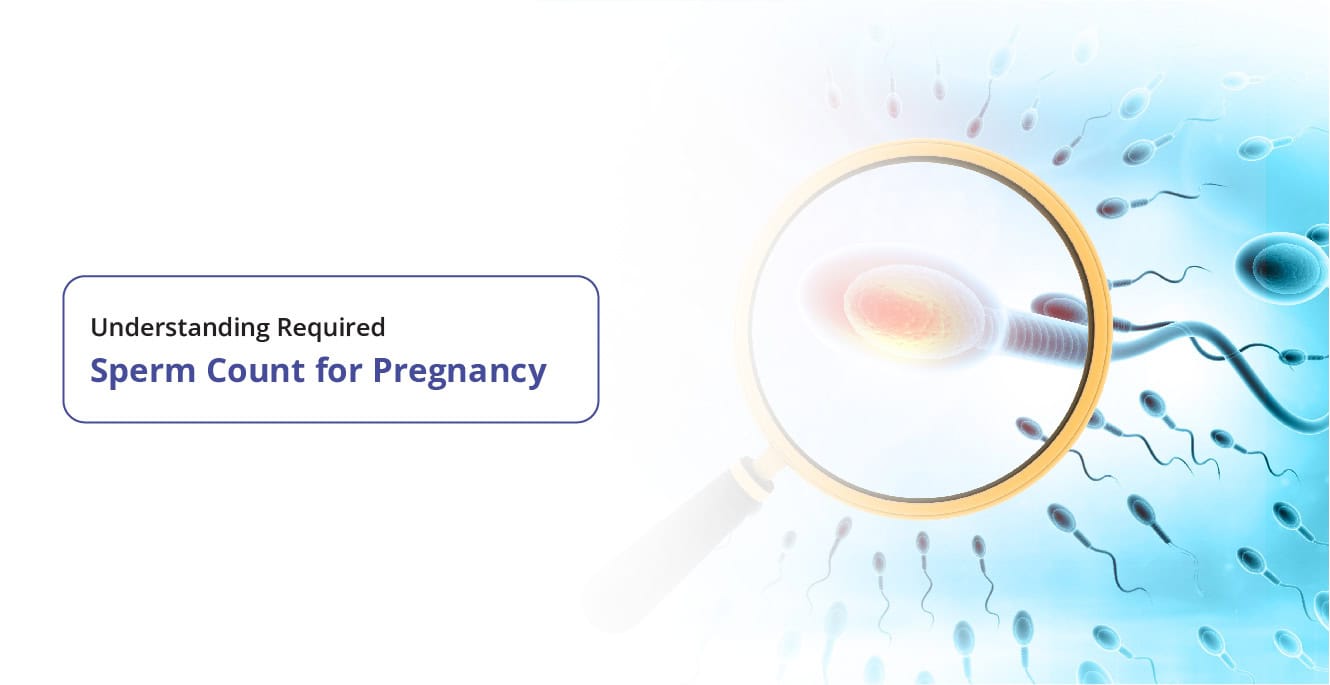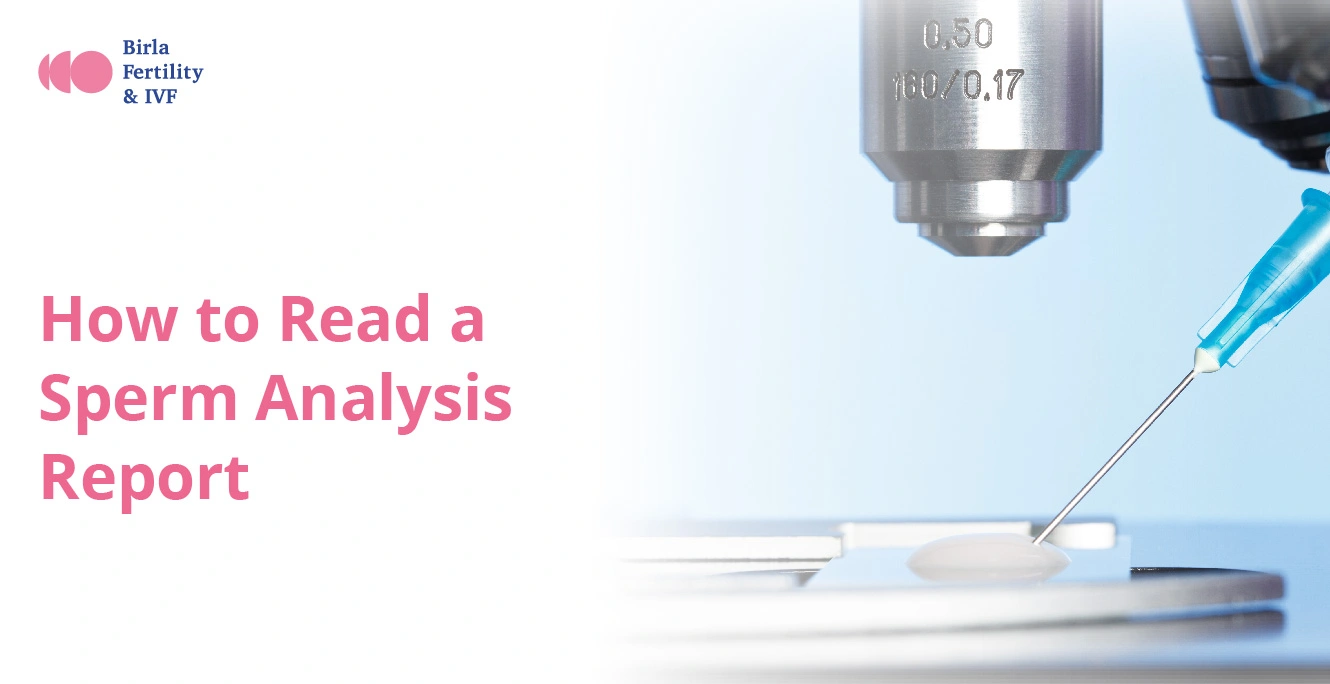
What Should be the Sperm Count for Pregnancy?

Table of Contents
The process of becoming pregnant is greatly influenced by male fertility, which is largely determined by the number of sperm in the body. We explore the complexities of sperm count, its importance in getting pregnant, and what counts are poor, average, good, or great in this extensive reference. Let’s examine the indicators that highlight the health of male reproduction.
What is Sperm Count?
The concentration of sperm in a specific volume of semen is referred to as the sperm count. This measure, which gives information on the amount of sperm accessible for fertilisation, is a basic component of evaluations of male fertility.
Significance of Sperm Count in Pregnancy
In order to successfully fertilise the egg and make it through the female reproductive tract, there must be enough quantity of healthy, motile sperm. As a result, sperm count plays a crucial role in the entire fertility equation.
Understand Sperm Count Spectrum: Poor to Excellent
- Low Sperm Count: Sperm counts under 15 million per millilitre are typically regarded as low. Because fewer sperm are accessible to travel to the egg, the chance of successful fertilisation is decreased by this reduced count.
- Average Sperm Count: Sperm counts in millilitres usually vary from 15 million to 200 million on average. Even though this is within the usual range, other aspects of fertility such as sperm motility and morphology should also be taken into account.
- Good Sperm Count: A good sperm count is more than 40 million sperm per millilitre. The likelihood that the sperm will successfully reach and fertilise the egg is increased by this higher count.
- Excellent Sperm Count: Counts of more than 60 million sperm per millilitre are frequently considered excellent. Within this range, higher sperm counts increase the likelihood of a successful conception.
Factors Influencing Range of Normal Sperm Count
The following are a few factors that ca influence the range of normal sperm count and can impact fertility:
- Lifestyle Factors: Sperm count can be positively impacted by modifiable lifestyle factors such as diet, exercise, abstaining from tobacco and excessive alcohol intake, and so on.
- Exposure to the Environment: Lower sperm counts can be caused by exposure to chemicals, contaminants in the environment, and extreme temperatures. Reproductive health should be maintained to the greatest extent possible by minimising exposure to these variables.
What is Normal Sperm Count?
A normal sperm count is typically considered to be around 15 million sperm per millilitre of semen or higher. One of the many characteristics measured in a semen analysis—a popular diagnostic procedure for assessing male fertility—is this count. It’s vital to remember that sperm count is only one component of male reproductive health; sperm motility (the movement of the sperm) and morphology (the form/structure of the sperm) are both key aspects in predicting fertility.
Normal Sperm Count: 15 million sperm per millilitre or more.
Low Sperm Count (Oligospermia): Less than 15 million sperm per millilitre.
For a complete understanding of male fertility, it is necessary to evaluate the results of a semen study in conjunction with other factors. It is advised to consult a reproductive endocrinologist or fertility specialist if there are fertility concerns. They can carry out a comprehensive analysis, take into account extra variables, and offer tailored advice depending on certain situations.
How to Assess Sperm Count?
The expert typically recommends semen analysis to evaluate the sperm count in order to check the potential of fertility. It is essential to understand where a particular sperm count falls within the spectrum for interpreting male fertility. Here’s a simplified chart to illustrate the categorization of sperm counts:
| Classification | Sperm Count (per milliliter) |
| Poor | Below 15 million |
| Average | 15 million to 40 million |
| Good | 40 million to 60 million |
| Excellent | Above 60 million |
How to Improve Sperm Count?
Following are a few tips that can help you improve sperm count for pregnancy:
- Support for Nutrition: A diet high in vitamins, minerals, and antioxidants promotes overall reproductive health and may increase sperm count.
- Sufficient Hydration: For the best sperm production, it is imperative to maintain adequate hydration. Sperm motility and count might be adversely affected by dehydration.
- Regular Workouts: Regular moderate exercise improves reproductive health as well as general well-being. Excessive and vigorous exercise should be avoided. Take part in mild physical activity. It promotes general well-being and aids in keeping a healthy weight. But stay away from long, hard workouts that could cause you to sweat and reduce the amount of sperm that are produced.
- Healthy Diet: Eat a well-balanced diet high in minerals, vitamins, and antioxidants. Add lean proteins, whole grains, fruits, and veggies. Oxidative stress can have an impact on sperm production, although antioxidants can prevent it.
- Stress Management: Prolonged stress can affect the balance of hormones and exacerbate problems with conception. Engage in stress-relieving activities like yoga, meditation, and deep breathing.
- Lifestyle Modifications: Smoking and excessive alcohol use have been related to decreased sperm counts. Sperm health can be improved by reducing or giving up certain behaviours.
- Obesity: There is evidence linking obesity to decreased sperm counts. It is advantageous to reach and maintain a healthy weight by a balanced diet and regular exercise.
- Get Adequate Sleep: Make sure you get a good night’s worth of sleep every night. Hormonal balance and general wellness depend on sleep.
- Avoid Exposure to Environmental Toxins: Reduce your exposure to chemicals, pollutants, and toxins in the environment. Certain environmental and occupational exposures can have a deleterious effect on sperm production.
- Limit Hot Tub Baths and Sauna: Extended periods of high-temperature exposure, as those found in saunas or hot tubs, can momentarily lower sperm production. Reducing time spent in extreme heat is recommended.
Conclusion
Understanding the road to conception requires an understanding of the subtleties of sperm count. Optimising sperm count adds to the larger picture of male reproductive health, whether it be through addressing lifestyle variables, looking for natural enhancements, or speaking with fertility specialists. It is vital to get a diagnosis to evaluate sperm motility, count, and morphology in cases of infertility. It offers insightful information on the health of male reproduction. Consulting with a fertility expert is essential if sperm count is an issue. A thorough assessment facilitates the identification of underlying causes and the development of suitable solutions. By understanding the sperm count metrics and their importance, individuals and couples can make well-informed decisions on their reproductive health. If you have issues with count or want to improve normal sperm count and seeking effective treatment options consult our fertility expert today, you can either give us a call directly at the number above or schedule an appointment by completing the given form. Our coordinator will get in touch with you soon to discuss your needs and set you up with the most qualified fertility specialist at Birla Fertility & IVF.
Frequently Asked Questions (FAQs)
- Can Tight Underwear Significantly Reduce Sperm Count?
While tight underwear may have a minor impact, the evidence linking it to significantly reduced sperm count is limited. More significant influences come from elements like lifestyle and general health.
- Does Masturbation Frequency Affect Sperm Count?
No, ejaculating frequently does not usually reduce the number of sperm. In fact, limiting the buildup of older, potentially damaged sperm, might even help preserve sperm quality.
- Can Herbal Supplements Dramatically Increase Sperm Count?
There isn’t a miracle cure that will significantly boost sperm count. Even if some supplements could be beneficial, it’s important to use caution when using them and seek the opinion of a healthcare provider for specific recommendations.
Our Fertility Specialists
Related Blogs
To know more
Birla Fertility & IVF aims at transforming the future of fertility globally, through outstanding clinical outcomes, research, innovation and compassionate care.
Had an IVF Failure?
Talk to our fertility experts

 Our Centers
Our Centers














